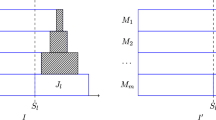Abstract
An extension of the NP-hard Johnson problem to the case of identical parallel machines at each stage is considered. When the number of stages is bounded by a constant and the number of machines is part of the input, a new polynomial time approximation scheme with an improved bound on the running time is designed.
Similar content being viewed by others

References
R. E. Buten and V. Y. Shen, “A Scheduling Model for Computer Systems with Two Classes of Processors,” in Proceedings of the 1973 Sagamore Comput. Conference Parallel Processing (1973), pp. 130–138.
B. Chen, “Scheduling Multiprocessor Flow Shops,” in Advances in Optimization and Approximation (Kluwer Acad., Dordrecht, 1994), pp. 1–8.
B. Chen, “Analysis of Classes of Heuristics for Scheduling a Two-Stage Flow Shop with Parallel Machines at One Stage,” J. Oper. Res. Soc. 46(2), 234–244 (1995).
B. Chen, C. N. Potts, and G. J. Woeginger, “A Review of Machine Scheduling: Complexity, Algorithms and Approximability,” in Handbook of Combinatorial Optimization, Vol. 3 (Kluwer Acad., Boston, 1998), pp. 21–169.
M. R. Garey and D. S. Johnson, “Strong NP-Completeness Results: Motivation, Examples and Implications,” J. Assoc. Comput. Mach. 25(3), 499–508 (1978).
M. R. Garey, D. S. Johnson, and R. Sethi, “The Complexity of Flowshop and Jobshop Scheduling,” Math. Oper. Res. 1(2), 117–129 (1976).
J. N. D. Gupta, “Two-Stage Hybrid Flowshop Scheduling Problem,” J. Oper. Res. Soc. 39(4), 359–364 (1988).
L. A. Hall, “Approximability of Flow Shop Scheduling,” Math. Programming, Series B 82(1–2), 175–190 (1998).
D. S. Hochbaum and D. B. Shmoys, “Using Dual Approximation Algorithms for Scheduling Problems: Theoretical and Practical Results,” J. Assoc. Comput. Mach. 34(1), 144–162 (1987).
J. A. Hoogeveen, J. K. Lenstra, and B. Veltman, “Preemptive Scheduling in a Two-Stage Multiprocessor Flow Shop is NP-Hard,” Eur. J. Oper. Res. 89(1–2), 172–175 (1996).
K. Jansen and M. I. Sviridenko, “Polynomial Time Approximation Schemes for the Multiprocessor Open and Flow Shop Scheduling Problem,” in Lecture Notes in Computer Science, Vol. 1770: 17th Annual Symposium on Theoretical Aspects of Computer Science, STACS 2000 (Springer, Berlin, 2000), pp. 455–565.
K. Jansen, R. Solis-Oba, and M. I. Sviridenko, “Makespan Minimization in Job Shops: a Linear Time Approximation Scheme,” SIAMJ. Discrete Math. 16(2), 288–300 (2003).
C. Koulamas and G. J. Kyparisis, “Asymptotically Optimal Linear Time Algorithms for Two-Stage and Three-Stage Flexible Flow Shops,” Naval Res. Logist. 47(3), 259–268 (2000).
M. A. Langston, “Interstage Transportation Planning in the Deterministic Flow-Shop Environment,” Oper. Res. 35(4), 556–564 (1987).
C. Y. Lee and G. L. Vairaktarakis, “Minimizing Makespan in Hybrid Flowshops,” Oper. Res. Lett. 16(3), 149–158 (1994).
S. Sahni, “Algorithms for Scheduling Independent Tasks,” J. Assoc. Comput. Mach. 23(1), 116–127 (1976).
P. Schuurman and G. J. Woeginger, “A Polynomial Time Approximation Scheme for the Two-Stage Multiprocessor Flow Shop Problem,” Theoret. Comput. Sci. 237(1–2), 105–122 (2000).
S. V. Sevastyanov, “Some Generalizations of the Johnson Problem,” Upravlyaemye Sistemy 21, 45–61 (1981).
S. V. Sevastyanov, “Construction of an Approximate Schedule for a Flow-Type System,” Upravlyaemye Sistemy 31, 66–71 (1993).
S. V. Sevastyanov, “Geometrical Heuristics for Multiprocessor Flowshop Scheduling with Uniform Machines at Each Stage,” J. Sched. 5(3), 205–225 (2002).
C. Sriskandarajah and S. P. Sethi, “Scheduling Algorithms for Flexible Flow Shops:Worst and Average Case Performance,” European J. Oper. Res. 43(2), 143–160 (1989).
D. P. Williamson, L. A. Hall, J. A. Hoogeveen, C. A. J. Hurkens, J. K. Lenstra, S. V. Sevastyanov, and D. B. Shmoys, “Short Shop Schedules,” Oper. Res. 45(2), 288–294 (1997).
Author information
Authors and Affiliations
Corresponding author
Additional information
Original Russian Text © S.V. Sevastyanov, 2007, published in Diskretnyi Analiz i Issledovanie Operatsii, Ser. 1, 2007, Vol. 14, No. 2, pp. 25–46.
Rights and permissions
About this article
Cite this article
Sevastyanov, S.V. An improved approximation scheme for the Johnson problem with parallel machines. J. Appl. Ind. Math. 2, 406–420 (2008). https://doi.org/10.1134/S1990478908030113
Received:
Accepted:
Published:
Issue Date:
DOI: https://doi.org/10.1134/S1990478908030113



